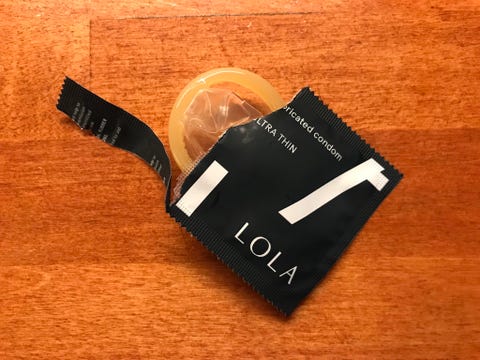These days, it seems like every product under the sun has some sort of gluten-free iteration: you can buy gluten-free soap, gluten-free water, and gluten-free hairspray. Now, the all-natural personal care company Lola has launched a line of condoms ($11 for 12) that purport to be paraben-free, fragrance-free, casein-free, and, of course, gluten-free. Lola joins other condom companies Glyde, Green Condom Club, and Sustain, which also offer products that claim to be totally devoid of the dreaded gluten.
At this point, you’re probably wondering: wait, condoms have gluten in them? Well, according to a statement sent to MensHealth.com from Lola co-founders Alex Friedman and Jordana Kier, most condoms don’t. But there’s a chance that they use lubricant that does, “since gluten in personal care products is commonly used as an emulsifier, stabilizer, and/or filler,” Friedman and Kier wrote.

Claire Lampen
Because the Food and Drug Administration (FDA) classifies condoms as medical devices, condom manufacturers are not required to disclose product ingredients. That means that if you do have a sensitivity to gluten, you’d likely have no way of knowing whether your favorite brand of condoms contains gluten or not, Friedman and Kier said.
So, OK, yes: theoretically, there could be any number of glutenous materials lurking atop your average penis sheath. But does it actually matter?
What is gluten?

Getty Images
Gluten is the term for the proteins found in grains like wheat, rye, and barley. While it’s often found in breads, pastas, and cookies, it can also be found in other sources, such as certain types of salad dressing or soup.
A small percentage of the population has celiac disease, an autoimmune disorder that renders the small intestine hypersensitive to gluten, resulting in symptoms like diarrhea, vomiting, and abdominal pain. Additionally, some people may also have an increased sensitivity to gluten, which is sometimes referred to as “non-celiac gluten sensitivity.”
According to Friedman and Kier, if a person with celiac disease or non-celiac gluten sensitivity used a condom that had gluten in the lubricant, they could develop an “itchy, blistering rash” called dermatitis herpetiformis, particularly if they put the condom in their mouth.
“Since we’ve seen a recent rise in celiac and gluten intolerance among the U.S. population,” Friedman and Kir wrote, “we wanted to be sure that our customers know our ultra-thin lubricated condoms are safe for use should they need a gluten-free option.”
How many people have celiac disease or non-celiac gluten sensitivity?
As it turns out, not that many: less than 1% of the population has celiac disease, according to the Celiac Disease Center, and estimates vary widely in terms of how many people have a non-celiac gluten sensitivity.
Still, that hasn’t stopped people from embracing the gluten-free lifestyle. In 2015, nearly 20 percent of Americans reported that they were gluten-free, and according to
the purported benefits of a gluten-free diet, such as weight loss, are vastly overhyped, and many gluten-free products may be just as unhealthy as their gluten-filled counterparts.
Honestly? Probably not.
“This question, believe it or not, has never come up in over a thousand patients with celiac, and over eight times as many with non-celiac gluten sensitivity,” Cynthia Rudert, M.D., medical advisor for the Celiac Disease Foundation and for the Gluten Intolerance Group of North America, told MensHealth.com. “As far as I know, there’s no gluten in condoms.”
Even if there were, says Rudert, gluten can’t be absorbed through the skin, so if someone simply touches gluten, they probably won’t have any gastrointestinal complications. A small number of people may experience a topical reaction if they use a body lotion, a shampoo, or a lipstick with gluten in it, but it’s tough to predict whether they’ll actually have symptoms. “It’s a very chameleon-like disorder,” Rudert says.
“As far as I know, there’s no gluten in condoms.”
Deepak A. Kapoor, MD, President of Advanced Urology Centers of New York, agreed that even a gluten-sensitive person probably won’t have much of a reaction to a condom with gluten in the lubricant. But that’s not to say that products like Lola’s don’t have benefits.
“The main advantage of these organic condoms, if you will, isn’t so much that they have gluten or not …. it’s that they’re a little bit more compulsive about saying what’s in the packet, as opposed to a conventional condom manufacturer,” Kapoor told MensHealth.com.
When it comes to safe condom use, Kapoor says, you shouldn’t be concerned about things like gluten and parabens. It’s far more important to ensure you’re using condoms before their expiration date, and storing them properly (i.e., not carrying them around in your wallet or pockets, where they can degrade over time).
“It’s much more important to make sure you’re using a viable product that’s been taken care of properly, because the point of the condom is the prevention of pregnancy and the limitation of transmission of sexually transmitted disease,” Kapoor said. “It’s important that people not lose sight of the forest for the trees.”
And if you need additional help picking out the best condom for you, check out our list below.
Source: Read Full Article





